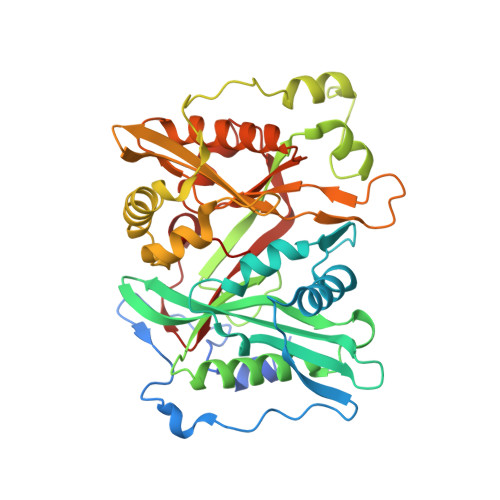Identification of Selective Inhibitors ofPlasmodiumN-Myristoyltransferase by High-Throughput Screening.
Harupa, A., De Las Heras, L., Colmenarejo, G., Lyons-Abbott, S., Reers, A., Caballero Hernandez, I., Chung, C.W., Charter, D., Myler, P.J., Fernandez-Menendez, R.M., Calderon, F., Palomo, S., Rodriguez, B., Berlanga, M., Herreros-Aviles, E., Staker, B.L., Fernandez Alvaro, E., Kaushansky, A.(2020) J Med Chem 63: 591-600
- PubMed: 31850752
- DOI: https://doi.org/10.1021/acs.jmedchem.9b01343
- Primary Citation of Related Structures:
6NXG - PubMed Abstract:
New drugs that target Plasmodium species, the causative agents of malaria, are needed. The enzyme N -myristoyltransferase (NMT) is an essential protein, which catalyzes the myristoylation of protein substrates, often to mediate membrane targeting. We screened ¡«1.8 million small molecules for activity against Plasmodium vivax ( P. vivax ) NMT. Hits were triaged based on potency and physicochemical properties and further tested against P. vivax and Plasmodium falciparum ( P. falciparum ) NMTs. We assessed the activity of hits against human NMT1 and NMT2 and discarded compounds with low selectivity indices. We identified 23 chemical classes specific for the inhibition of Plasmodium NMTs over human NMTs, including multiple novel scaffolds. Cocrystallization of P. vivax NMT with one compound revealed peptide binding pocket binding. Other compounds show a range of potential modes of action. Our data provide insight into the activity of a collection of selective inhibitors of Plasmodium NMT and serve as a starting point for subsequent medicinal chemistry efforts.
Organizational Affiliation:
Center for Infectious Disease Research , Seattle , Washington 98109 , United States.























